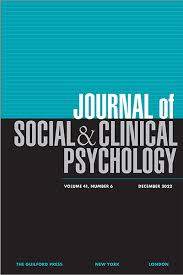
Journal of Social and Clinical Psychology (JSCP)
Journal Descriptions
This journal is devoted to the application of theory and research from social psychology toward the better understanding of human adaptation and adjustment, including both the alleviation of psychological problems and distress (e.g., psychopathology) and the enhancement of psychological well-being among the psychologically healthy. Topics of interest include, but are not limited to, traditionally defined psychopathology (e.g., depression), common emotional and behavioral problems in living (e.g., conflicts in close relationships), the enhancement of subjective well-being, and the processes of psychological change in everyday life (e.g., self-regulation) and professional settings (e.g., psychotherapy and counseling). Articles reporting the results of theory-driven empirical research are given priority, but theoretical articles, review articles, clinical case studies, and essays on professional issues are also welcome. Articles describing the development of new scales (personality or otherwise) or the revision of existing scales are not appropriate for this journal.
Journal of Social and Clinical Psychology (JSCP) is :-
-
International, Peer-Reviewed, Open Access, Refereed, Social Psychology, Clinical Psychology , Online or Print , Bi-Monthly Journal
- UGC Approved, ISSN Approved: P-ISSN P-ISSN: 1943-2771, E-ISSN: 0736-7236, Established: 1980,
- Does Not Provide Crossref DOI
-
Not indexed in Scopus, WoS, DOAJ, PubMed, UGC CARE

